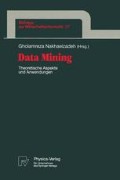Zusammenfassung
Während in der statistischen Literatur die Begriffe ‚kausal‘, ‚Kausalität ‘kaum Verwendung finden, sind diese Begriffe im Rahmen der Abhängigkeitsanalyse weit verbreitet. Ergebnisse der Abhängigkeitsanalyse können genutzt werden, um kausale Aussagen zu machen; diese entsprechen zum einen dem wahrscheinlichkeitstheoretischen Ansatz von P. Suppes oder dem kontrafaktischen Ansatz von D. Rubin. In der Arbeit werden diese Ansätze und ihre Beziehungen zueinander analysiert. Die Abschnitte 5 und 6 zeigen deren Beziehungen zu graphentheoretischen Ansätzen und sie geben Bedingungen an, die erfüllt sein müssen, um Graphen kausal interpretieren zu können.
Access this chapter
Tax calculation will be finalised at checkout
Purchases are for personal use only
Preview
Unable to display preview. Download preview PDF.
Literatur
Barnard, G. A.: Causation, in: Kotz, Johnson (eds.), Encyclopaedia of Statistical Sciences vol. 1, New York et al, 1982, pp 387–389.
Cox, D. R., Wermuth, N.: Multivariate Dependencies, London, 1996
Cox, D. R.: Causality: Some Statistical Aspects, J. R. Statistical Society A, 1992, 291–301
Davis, W. A.: Probabilistic Theories of Causation, in: Probability and Causality (H. Fechner, ed.), Amsterdam, 1988
Fayyad, U. et. al. (ed.): Advances in Knowledge Discovery and Data Mining, Menlo Park, 1996
Holland, P.: Statistics and Causal Inference, J. Amer. Stat. Assoc., 1986, 945–970
Pearl, J.: Comment: Graphical Models, Causality and Intervention, Statistical Science 1993, 266–269
Pearl, J.: Probabilistic Reasoning in Intelligent Systems, San Mateo, 1988
Pratt, J., Schlaifer, R.: On the interpretation and observation of laws, Journal of Econometrics, 1988, 23–52
Rubin, D. B.: Estimating Causal Effects of Treatments in Randomized and Nonrandomized Studies, J. Educational Psychology, 1974, 688–701
Simon, H.: Spurious Correlation: A Causal Interpretation, in: H. M. Blalock (ed.), Causal Models in the Social Sciences, London, 1971, pp 5–17.
Skyrms, Brain: Probability and Causation, Journal of Econometrics 39, 1988, 53–68
Spirtes, P., Glymour, C. Scheines, R.: Causation, Prediction and Search, New York, 1993
Suppes, P.: A. Probabilistic Theory of Causation, Amsterdam, 1970
Author information
Authors and Affiliations
Editor information
Editors and Affiliations
Rights and permissions
Copyright information
© 1998 Physica-Verlag Heidelberg
About this chapter
Cite this chapter
Kischka, P. (1998). Kausale Interpretation von Graphen. In: Nakhaeizadeh, G. (eds) Data Mining. Beiträge zur Wirtschaftsinformatik, vol 27. Physica-Verlag HD. https://doi.org/10.1007/978-3-642-86094-2_8
Download citation
DOI: https://doi.org/10.1007/978-3-642-86094-2_8
Publisher Name: Physica-Verlag HD
Print ISBN: 978-3-7908-1053-0
Online ISBN: 978-3-642-86094-2
eBook Packages: Springer Book Archive

